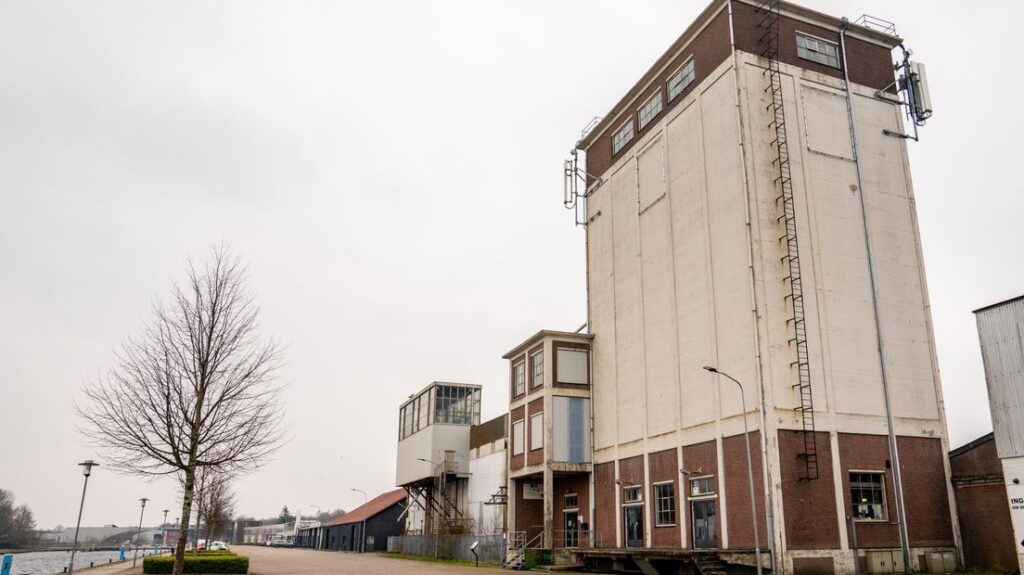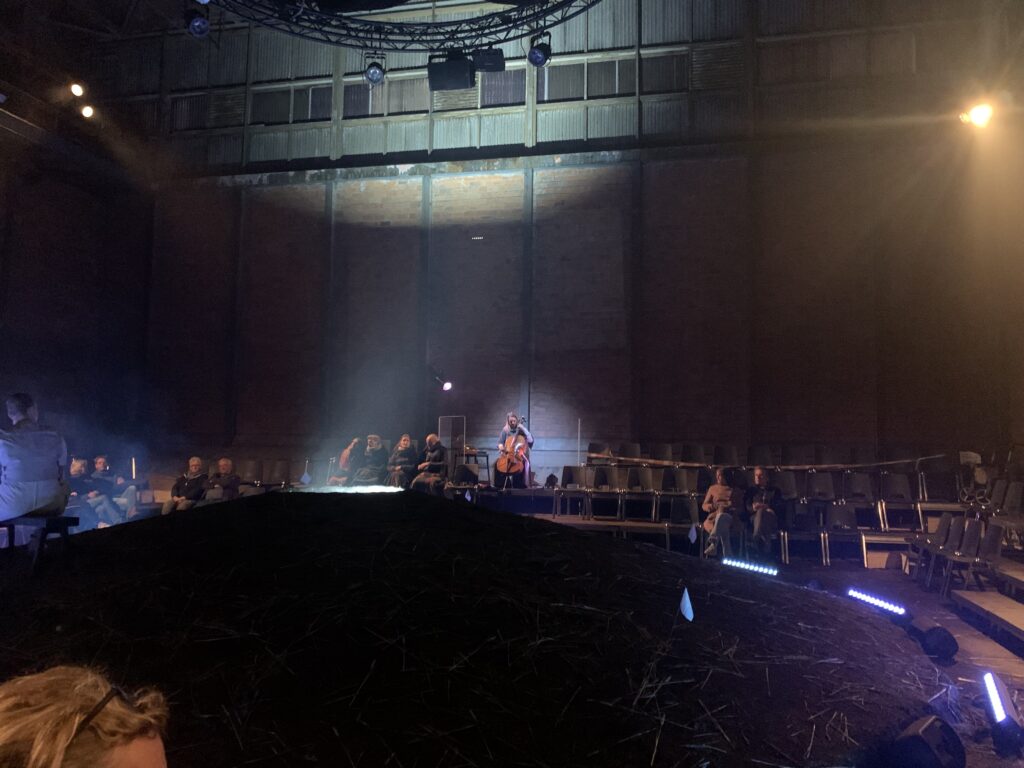Created and developed by a renowned Dutch-Ukrainian writer and VATAHA’s frequent collaborator Lisa Weeda, Graan/Зерно explores Ukraine’s history, trauma, and resilience through one of its most symbolic elements: wheat. The play interweaves the lives of three generations of a Ukrainian family from a fictional village of Veliki Bobriki. Spanning various time periods, the play moves between three alternating timelines: the Holodomor (1932-33), the 2022 full-scale invasion, and a post-war future where Ukrainians labor to demine their fields.
Graan/Зерно is masterfully staged by peergroup — a location theatre group in Assen. The location chosen for this performance, an old grain silo, could not be more symbolic, drawing on the common rich agricultural heritage of both Ukraine and the Netherlands.

Viewers were invited to sit in a circle around a mound of earth sparsely covered with grain, which offered a unique and striking 360-degree perspective on the performance.
Lisa Weeda describes the demining of farmland as “an under-discussed issue that will affect the country for decades,” and this haunting reality becomes the play’s starting point. The story begins with a vision of the future, where the war is over and Ukraine has been fully de-occupied. Halyna, a young woman, returns to her mother’s field to clear the land of mines. As she digs into the soil, the past begins to surface, literally and metaphorically: through a hole in the earth, her mother Ana suddenly appears and is thrust back into the harvest season of July 2022, when she and her husband Artem faced an impossible choice — to stay on their land until the enemy came too close, or to flee. Just as Ana begins to orient herself, another figure emerges from the same opening: Mykhailo, a great-great-grandfather of Halyna, who finds himself trapped once again in the 1930s, the years of Stalin’s terror, collectivization, and the Holodomor. Haunted by the land’s memory, he receives letter after letter that he must read aloud, or the hole in the middle of the room begins to scream.
Through these intertwined lives, Ukraine’s grain history rises from the soil piece by piece, revealing an unbroken cycle of suffering and endurance. The play suggests that nothing has ever truly changed: everyone seeks control over this black, fertile earth, and those who live upon it remain both sustained and imprisoned by it. However, it leaves off feeling hopeful for change and a better future.
In the present, however, Graan/Зерно draws attention to the devastating reality faced by Ukrainian farmers today — those who continue to cultivate and defend their fields, yet ultimately often lose their harvest and land amid ongoing war. Through the character of Mykhailo, the play also explores the guilt and shame of surviving oppression and famine thanks to making impossible choices in times of struggle, and the intergenerational trauma that ripples through generations that follow as a result.
With only three performers on stage Graan/Зерно relies entirely on the strength of its acting and the chemistry between them. With a minimalist set, which leaves no distractions, René Groothof, Dora Groothof and Charlie Panneman beautifully brought the shifting timelines and three generations of one Ukrainian family to life. The performance was accompanied by an enigmatic live score by the talented Dobrawa Czocher, featuring live vocals in addition and live music loop station, in addition to a cello soundtrack.

And after the show, there is beer brewed by Assen brewers using authentic Ukrainian grain. There is also an opportunity to view and purchase as posters photos by Ivan Samoilov, curated by Kateryna Radchenko.
The show runs from October 4th to 19th. All performances are in Dutch.
If you want more than just the theater performance, there is also one more special Grain Dinner on October 19 from 6:00 PM to 8:00 PM , during which Lisa Weeda will talk to journalist Eva Peek, veteran Oleksii Mykhailov, writer Frank Westerman, journalist Jelle Brandt Corstius and musician Katja Dirven about oppression, drones, the future, the present, and of course grain.
VATAHA Recommends features events and exhibitions unaffiliated with VATAHA but aligned with our mission to promote Ukrainian arts and culture in the Netherlands.
This recommendation was suggested by Olena Poburko. Check out all VATAHA Recommends here.